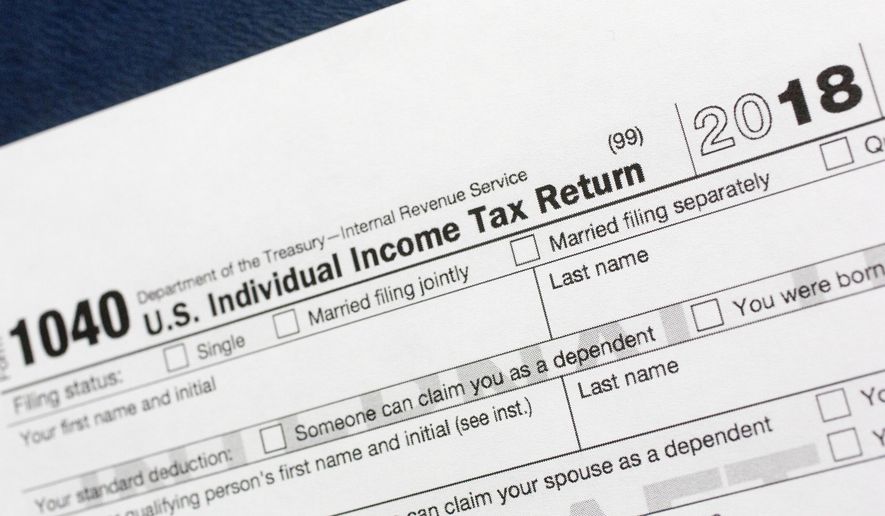Virginia lawmakers have a choice to make during the 2019 legislative session that starts next week: Take steps to change the state tax code or risk a $500 million-plus increase in their constituents’ state tax bills.
Though most state taxpayers saw a tax cut at the federal level, Congress’s changes to make the federal standard deduction more attractive could prompt them to forgo itemizing on their Virginia returns. Taxpayers will come out ahead overall, but their state tax bills will look a little bigger — and the state’s treasury a little flusher.
States across the country are grappling with similar issues, as most saw a bump in their revenue in the first year under the new federal tax code.
“The federal changes broaden the tax base while lowering tax rates, and only the base-broadening elements flow through to the states,” said Jared Walczak, a senior policy analyst at the Tax Foundation. “So they still have their same rates — they would collect more revenue to the degree that they were conforming to federal law.”
Some states have returned the money to residents in the form of tax cuts or credits, as they grapple with changing their tax forms to match the federal changes.
In Maryland, lawmakers adjusted the state’s personal income tax exemptions — which were axed at the federal level — and made other changes.
Republican Gov. Larry Hogan said the state managed to stave off a potential $3 billion tax increase for state residents over the next five years.
In Georgia, lawmakers cut the state’s individual and corporate tax rates and set those changes to expire at the end of 2025, when many of the individual tax benefits in the federal law also are scheduled to run out.
They also doubled the state’s standard deduction, to $4,600 for individuals and $6,000 for couples, attaching the same expiration date.
All told, Democratic Gov. Nathan Deal estimated the state tax cuts would total $5 billion over the next five years.
In Utah, lawmakers used a special session in July to approve a $30 million expansion of the state’s child tax credit, after the public complained that a 0.05 percent income tax cut the legislature passed earlier in the year was insufficient.
The child credit change was aimed at softening the blow, particularly for larger families, from the loss of the personal exemptions in the federal code. In 2017, taxpayers had been able to take $4,050 exemptions for themselves, their spouses, and qualifying children on their federal returns.
But Virginia is among those that punted the big decisions into the new year.
The state’s tax code typically requires those who take the standard deduction at the federal level to also take it on their state returns.
The federal changes essentially doubled the standard deduction to $12,000 for individuals and $24,000 for couples, making it more attractive for taxpayers.
But unlike Georgia, for example, Virginia’s rates didn’t change and lawmakers haven’t made up the difference elsewhere, meaning those residents could end up paying more to the Old Dominion than they would normally.
“By doing nothing, the state’s going to get a whole hell of a lot of money,” said Mike Thompson, who heads the Thomas Jefferson Institute for Public Policy, a think tank in Northern Virginia.
Mr. Thompson’s group has a plan that would use the additional money to double the state’s standard deduction, offsetting some of the anticipated hit, and lower Virginia’s corporate income tax rate as well.
“We want to give it all back,” he said.
Virginia Gov. Ralph Northam, a Democrat, says he wants to use about half of the anticipated additional money next year to expand the earned income tax credit, while acknowledging that other options are in play.
But statehouse Republicans say the governor’s plan would benefit people who already pay no federal income tax and would result in an effective tax hike on the middle class.
“Before we can contemplate new spending, the General Assembly will have to resolve the governor’s willingness to allow by inaction a tax increase and the elimination of key deductions on mortgage interest and property taxes,” said Republican Del. S. Chris Jones, chairman of the House Appropriations Committee.
Last year, many states opened their legislative sessions at the beginning of January, just after the federal tax law passed in December 2017, leaving them little time to figure out the new landscape.
“I think they were very flat-footed,” said Meg Wiehe, deputy director of the Institute on Taxation and Economic Policy. “We were even flat-footed, and we’ve been spending the whole year trying to think about what the implications of various changes would be.”
• David Sherfinski can be reached at dsherfinski@washingtontimes.com.




Please read our comment policy before commenting.